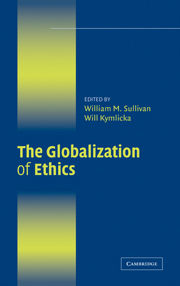Book contents
- Frontmatter
- Contents
- Contributors
- Acknowledgments
- 1 Introduction: The Globalization of Ethics
- 2 Global Ethics and the International Law Tradition
- 3 Morality and Universality in Jewish Thought
- 4 Globalization and Christian Ethics
- 5 Buddhism and the Globalization of Ethics
- 6 Muslim Perspectives on Global Ethics
- 7 Confucianism: Ethical Uniformity and Diversity
- 8 Natural Law, Common Morality, and Particularity
- 9 Liberalism and the Globalization of Ethics
- 10 Feminist Perspectives on a Planetary Ethic
- 11 Ethical Universalism and Particularism: A Comparison of Outlooks
- Appendix: Key Documents on Global Ethics
- A Universal Declaration of Human Rights
- B International Covenant on Civil and Political Rights
- C International Covenant on Social, Economic and Cultural Rights
- D Declaration Toward a Global Ethic
- E Universal Islamic Declaration of Human Rights
- F Cairo Declaration on Human Rights in Islam
- G The Bangkok Declaration
- H Asian Human Rights Charter: A People's Charter
- Bibliography
- Index
H - Asian Human Rights Charter: A People's Charter
Published online by Cambridge University Press: 03 September 2009
- Frontmatter
- Contents
- Contributors
- Acknowledgments
- 1 Introduction: The Globalization of Ethics
- 2 Global Ethics and the International Law Tradition
- 3 Morality and Universality in Jewish Thought
- 4 Globalization and Christian Ethics
- 5 Buddhism and the Globalization of Ethics
- 6 Muslim Perspectives on Global Ethics
- 7 Confucianism: Ethical Uniformity and Diversity
- 8 Natural Law, Common Morality, and Particularity
- 9 Liberalism and the Globalization of Ethics
- 10 Feminist Perspectives on a Planetary Ethic
- 11 Ethical Universalism and Particularism: A Comparison of Outlooks
- Appendix: Key Documents on Global Ethics
- A Universal Declaration of Human Rights
- B International Covenant on Civil and Political Rights
- C International Covenant on Social, Economic and Cultural Rights
- D Declaration Toward a Global Ethic
- E Universal Islamic Declaration of Human Rights
- F Cairo Declaration on Human Rights in Islam
- G The Bangkok Declaration
- H Asian Human Rights Charter: A People's Charter
- Bibliography
- Index
Summary
Declared in Kwangju, South Korea, May 14–17, 1998.
Preamble
For long, especially during the colonial period, the peoples of Asia suffered from gross violations of their rights and freedoms. Today large sections of our people continue to be exploited and oppressed and many of our societies are torn apart by hatred and intolerance. Increasingly the people realize that peace and dignity are possible only when the equal and inalienable rights of all persons and groups are recognised and protected. They are determined to secure peace and justice for themselves and the coming generations through the struggle for human rights and freedoms. Towards that end they adopt this Charter as an affirmation of the desire and aspirations of the peoples of Asia to live in peace and dignity.
Background to the Charter
1.1 The Asian struggle for rights and freedoms has deep historical roots, in the fight against oppression in civil society and the political oppression of colonialism, and subsequently for the establishment or restoration of democracy. The reaffirmation of rights is necessary now more than ever before. Asia is passing through a period of rapid change, which affects social structures, political institutions and the economy. Traditional values are under threat from new forms of development and technologies, as well as political authorities and economic organizations that manage these changes.
- Type
- Chapter
- Information
- The Globalization of EthicsReligious and Secular Perspectives, pp. 268 - 282Publisher: Cambridge University PressPrint publication year: 2007

